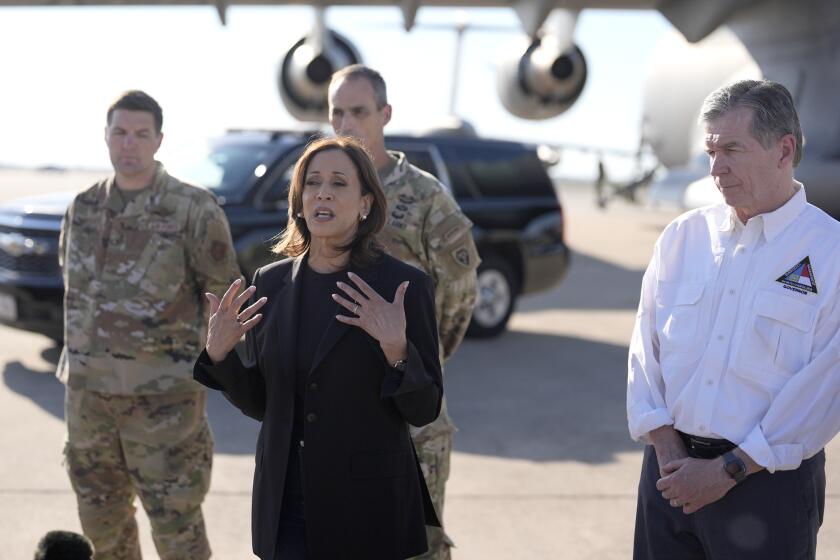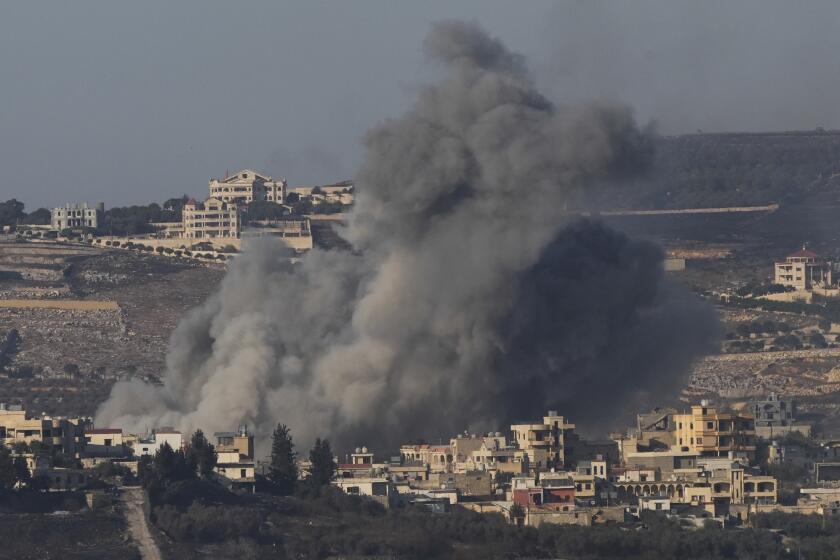Gorbachev in International Plea for Chernobyl : Catastrophes: The ‘tragedy . . . has not become a thing of the past,’ he says on the fifth anniversary of the nuclear accident.
President Mikhail S. Gorbachev appealed on Friday, the fifth anniversary of the Chernobyl nuclear accident, for continued international assistance to deal with the resulting medical and environmental problems.
“The Chernobyl tragedy has not become a thing of the past,” Gorbachev said. “Its scope, the time that it will persist and the consequences are such that humanity is just beginning to realize fully the global nature of the social, medical and psychological problems created by this catastrophe. . . .
“During the past five years, it has become evident that the efficiency of the struggle against the consequences of the catastrophe can be dramatically increased if many countries pool their efforts.”
Even with a virtual quadrupling in Soviet spending on Chernobyl--medical care for the victims, resettlement of villages in the radiation zone, clean-up of the plant--officials here now acknowledge that their government does not have the resources for what needs to be done.
Anticipating a sharp upsurge in cancer as well as an accelerated rise in a variety of other Chernobyl-related diseases, including cardiovascular problems, digestive tract illnesses and nervous disorders, medical authorities are pleading for a full range of medicines and equipment, starting with modern diagnostic instruments.
“Only last year, literally only last year, we managed to equip with the absolute minimum amount those clinics in the districts where the radiation was highest,” said Dr. Arkady K. Tomashev, the deputy minister of health in Byelorussia, the region where 70% of the radioactive material fell.
“It is not understood in the West how a clinic, any clinic, could exist without this equipment, let alone facilities that must do the type of diagnostic work they do.”
Dr. Victor M. Ponomarenko, the deputy health minister in the Ukraine, put the issue even more starkly: “A child has a better chance of surviving leukemia in Cuba than in the Ukraine, simply because we lack the kinds of drugs needed for treatment.”
Ponomarenko, Tomashev and other officials said that the medical problems resulting from Chernobyl were beyond the abilities of the Soviet government to manage.
Byelorussia, for example, needs to monitor the health of 2.2 million people, a fifth of its population, who were in the area where radioactive materials fell most heavily. The Ukraine is currently treating 15,000 children with enlarged thyroid glands, anticipating that several thousand could develop cancer.
Health officials pleaded for Western assistance--from governments, from charitable organizations, from companies manufacturing drugs and medical equipment--but asked that it come directly to their republics rather than through the Soviet central government in Moscow.
“Moscow is one of those proverbial black holes into which everything disappears, never to be heard of again,” Tomashev said. “Send it to Minsk, and we will show you where it is being used and the patients who are benefiting.”
Gorbachev noted that the World Health Organization is planning an international program to study the medical aspects of the accident and construct a radiation research center in the Soviet Union.
“I urge the governments of all countries, international, national and public organizations, and all people of good will to participate intellectually and financially in the international program,” he said. “The results . . . will be used in the interests of the whole of humanity.”
Soviet health and energy officials announced this month that the government is now spending the equivalent of $16 billion a year at the official exchange rate on caring for the victims of Chernobyl and cleaning up the still-present radiation.
They have estimated that the full cost of the disaster, including damage to crops and the value of abandoned buildings in the contamination zone, could be as high as $350 billion.
There is a growing controversy, meanwhile, over how many people have died as a result of the explosion and fire at the Chernobyl Atomic Energy Station.
According to official Soviet figures, 32 people have died as a direct result. But some scientists and radical politicians claim that the actual death toll was at least 250 and could now be as high as 10,000 when the diseases brought on by the radiation are taken into account.
In addition, more than 4 million people lived in the 52,000 square miles that the government says were hit by radioactive fallout--an area the size of Illinois--and could develop a variety of diseases over the next two or three decades.
On Friday, members of the Supreme Soviet, the country’s legislature, and of the Russian Federation legislature stopped their work for a minute of silence to remember those who died.
Soviet newspapers devoted several articles and commentaries to the anniversary, including a four-page supplement on the “Lessons From Chernobyl” in the Communist Party daily Pravda. Nearly half of the evening and midday newscasts were devoted to Chernobyl, including the help given by foreigners.
In the Ukraine, where the explosion at the Chernobyl nuclear power plant occurred in 1986, black ribbons were tied to flags throughout the capital, Kiev.
“On this day of national mourning, I want you to realize the scale of the disaster,” Vladimir Yaborivsky, one of the Ukraine’s top Chernobyl experts, told members of the republic’s legislature. “It was such that we have every right to say a third war, a nuclear war, happened in the Ukraine. What was science fiction became reality.”
More to Read
Sign up for Essential California
The most important California stories and recommendations in your inbox every morning.
You may occasionally receive promotional content from the Los Angeles Times.










